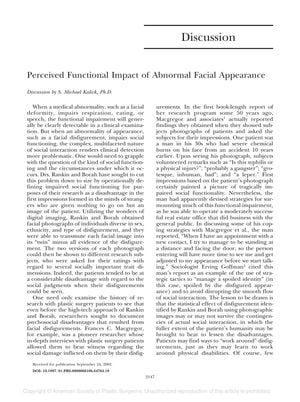Perceived Functional Impact of Abnormal Facial Appearance
June 2003
in “
Plastic and Reconstructive Surgery
”

TLDR People with facial disfigurements are judged more negatively, highlighting the social benefits of corrective surgery.
In the study by Rankin and Borah, the researchers explored the social disadvantages experienced by individuals with facial disfigurements by using digital imaging to create two versions of a person's photograph—one with the disfigurement and one without. Different subjects were shown these photographs and asked to rate them on various socially important traits. The findings indicated that individuals with visible disfigurements were judged more negatively, confirming the social impact of facial appearance. This research builds on earlier work, such as that by Macgregor, who documented the psychosocial effects of facial deformities through interviews with plastic surgery patients. The study also references historical research showing that cosmetic improvements, including hair restoration and rhinoplasty, lead to more favorable social perceptions. However, the likelihood of health insurance covering such procedures varies, with reconstructive surgeries being more likely to be covered than cosmetic ones. The document suggests that while patients may develop strategies to mitigate the social impact of their disfigurements, the preference would be to correct the impairment if possible. The research underscores the potential psychosocial benefits of appearance-altering surgeries across a spectrum of medical necessity.



